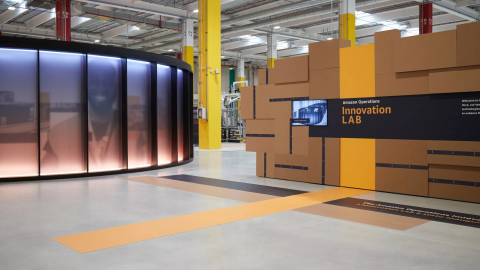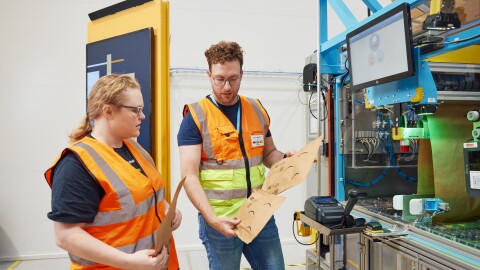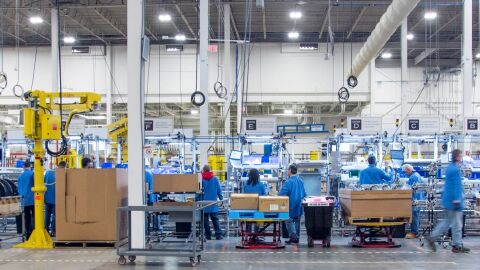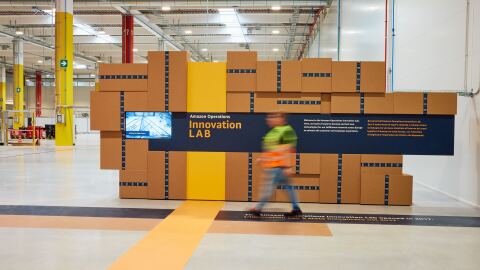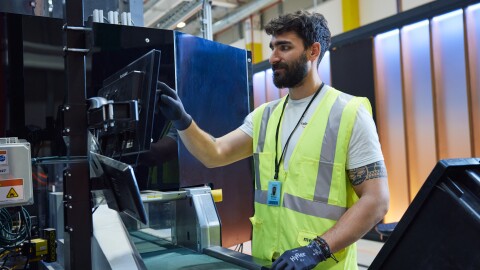The adoption of artificial intelligence (AI) in Europe is rapidly accelerating, with five businesses on average embracing the technology every minute, according to AWS's latest annual report, "Unlocking Europe's AI Potential 2025”. Further, 42% of businesses in Europe are now consistently using AI with over 90% are seeing a boost in revenue or productivity. This remarkable pace equates to nearly three million businesses across the continent in the past year [1].
The proportion of European firms consistently using AI has grown by 27% in the past year. Usage increased from around 33% in 2023 to 42% in 2024. This surpasses the uptake of other transformative technologies, such as mobile phones in the 2000s, when adoption growth peaked at 18% between 2007 and 2008 [2]. However, the growing gap in the depth of AI adoption between startups and large enterprises could create a two-tier AI economy. Regulatory uncertainty is a key barrier to further adoption, with businesses affected investing 28% less in AI.
If momentum continues, Europe could see near-universal AI adoption by 2030 [3]. The potential economic impact is significant, with recent research estimating that cloud-enabled AI could add more than $433 billion to Europe’s GDP by 2030 [4].
The two-tier AI economy
While the overall adoption rate is encouraging, the report warns of a potential two-tier AI economy emerging. Tech-driven start-ups are rapidly adopting AI and transforming industries, but many large established businesses lag behind in capitalising on its full potential.
Last year’s report revealed that larger companies led in basic AI adoption. This year’s report shows that start-ups [5] are surging ahead in both the depth and intention of their AI use, and leveraging AI to disrupt industries. The contrast is stark:
- 68% of start-ups have adopted AI, compared with 53% of large enterprises [6].
- 37% of start-ups are creating new AI-driven products, versus 13% of large enterprises.
- 42% of start-ups are using AI to drive business innovation, compared with 17% of large enterprises.
Only a quarter of established enterprises have a comprehensive AI strategy, and just 3% have integrated AI into the core of their operations. Many larger firms lack a clear plan to deepen their adoption or the flexibility to unlock AI’s potential at pace, despite nearly all of them reporting productivity gains from using the technology.
“Europe’s AI revolution is already outpacing the mobile phone boom, with five businesses adopting AI every minute. It’s exciting to see startups leading the way on innovation, but simply celebrating adoption numbers masks a deeper challenge," said Tanuja Randery, Managing Director for Europe, the Middle East and Africa. "Without addressing key barriers, such as capital access, streamlined regulation and skills development, we risk creating a two-tier AI economy where some businesses use AI superficially rather than transformatively. Europe’s competitiveness depends on turning basic adoption into deep integration across businesses of all sizes, and AWS is committed to supporting Europe with the infrastructure and skills training to respond to this challenge.”
Barriers to deeper AI adoption
To maintain competitiveness and foster innovation across businesses of all sizes, Europe must overcome key obstacles to deeper AI adoption:
- Skills gap: There is a critical lack of digital skills. Firms expect that half of the new jobs in Europe over the next three years will require AI literacy. However, only a quarter report having a strong AI skillset within their business.
- Regulatory uncertainty: Nearly seven in 10 (68%) businesses struggle to understand their responsibilities under the EU AI Act’s requirements. This uncertainty is impacting investment, with affected businesses planning to invest 28% less in AI over the next year than those who understand regulation.
- Perceived costs: 35% of businesses report that cost is a key barrier to adoption, yet 44% of businesses adopting AI have experienced enhanced automation and efficiency, and over 90% say AI adoption has increased their revenue. Over half (56%) of start-ups identify clear pathways to venture capital and funding as critical to faster growth.
Accelerating AI adoption: A three-point plan
AWS is urging European governments and policy-makers to take immediate steps to unlock the full potential of AI for both fast-paced start-ups and larger enterprises:
- Build a pro-growth regulatory environment: Cut compliance costs (according to the report, currently 40% of IT spending) and harmonise standards across countries to enable efficient scaling, incentivising businesses to increase adoption.
- Accelerate private sector digital adoption: Streamline access to private finance for start-ups and to government funding for all businesses (45% of businesses cite this as critical), and build industry-specific digital skills programs (84% see AI skills as crucial, only 26% feel prepared).
- Modernise public sector technology: Prioritise digital transformation in healthcare and education (top citizen priorities), and use public procurement to drive innovation (78% of businesses are more likely to adopt AI if government leads).
AWS is committed to working with European governments to foster a competitive environment for European businesses, and to support the broad adoption of generative AI. Last year, AWS announced plans to expand its infrastructure and operations across Europe, supporting thousands of jobs. AWS has committed $1 billion in cloud credits for start-ups developing generative AI solutions in 2025, and $100 million as part of the AWS Education Equity Initiative to support underserved learners in gaining skills in AI and cloud computing.
To learn what's at stake for Europe's AI future, read the full report here.
[1] Eurostat: 32 million enterprises in the EU, source: https://ec.europa.eu/eurostat/web/products-eurostat-news/w/ddn-20231212-1. 9% of businesses adopted AI for the first time in the past year (33% adopted in 2023, 42% adopted in 2024.) This equates to 2,880,000 businesses in the past year; 5.48 businesses adopting AI each minute.
[2] The highest annual increase in global mobile phone adoption occurred between 2007 and 2008. In this period the number of mobile subscribers increased by 18%. Source: https://stats.areppim.com/stats/stats_mobilexpenetr.htm
[3] ‘Near-universal adoption’ is classified as 90% of all businesses in Europe.
[4] Source: https://www.aboutamazon.com/news/aws/ai-cloud-adoption-economic-impact-gdp-aws
[5] An AI-focused startup is an organisation where AI is considered integral to its products or services.
[6] A large enterprise (also referred to as large business and established enterprise) is a business with more than 500 employees founded 10 years ago or more.




